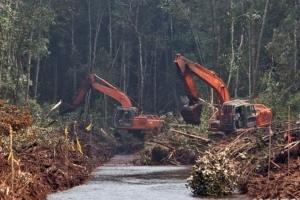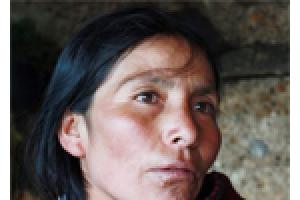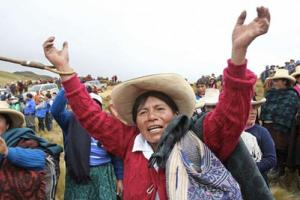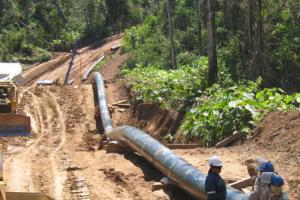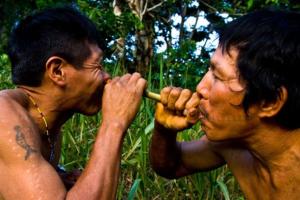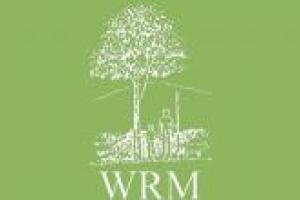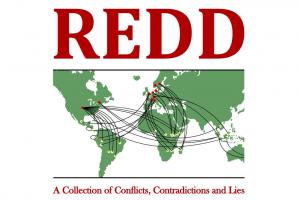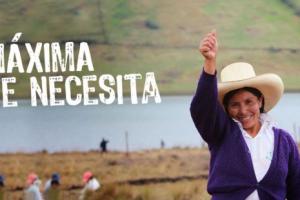Hundreds of people are detained in Indonesia for having claimed their rights on their land, forests and other resources while resisting eviction and land grabs. The reality is that Indonesia’s Forest Law on Prevention and Eradication of Forest Destruction, ostensibly intended to protect the forests from organized crime and illegal logging, is instead being used to criminalize Indigenous Peoples and local communities.
Peru
Other information
16 September 2015
Other information
10 July 2015
The “Weaving Resistances” project, from the Organization "Democracy and Global Transformation Program" in Peru, shares three videos that are testimony to a constant and courageous struggle of, especially, women from the provinces of Celendin, Bambamarca and Cajamarca in Peru's northern highlands.
Other information
11 March 2015
Máxima Acuña, a mother of four in the northern Andes of Peru who was never able to learn to read or write, won a lawsuit against the Yanacocha mining company, South America’s leading gold producer. In spite of this, the company has continued its violent intimidation against her. So far in 2015, Máxima has been threatened at least twice by police and agents for Securitas, Yanacocha’s private security firm, entered her property. On February 12, a World Day of Solidarity with Máxima was held.
Bulletin articles
10 March 2015
Conga: Lagoons versus mines
“I had never been to the lagoons before the marches began and we had to go and defend them. The Elders said that (the Celendín lakes) were sacred, no one was allowed to set foot there, they were the sites for sacred ceremonies and traditional healers came here to collect medicines. The Elders called this place Conga,” said a young rondera (peasant patroller) from Cajamarca when she saw the lagoons.
Bulletin articles
9 December 2014
The Matsés indigenous people are fighting back to stop Pacific Rubiales Energy, a Canadian oil and gas company, from destroying their territory and endangering their lives and forests. One of the company’s exploration blocks, on the Brazilian border, is in an area proposed for designation as a national reserve, theoretically to protect the Matsés. Another block overlaps with land officially demarcated as the territory of this indigenous people. But the Matsés are standing up against the company.
Other information
9 December 2014
The video from “If Not Us Then Who?” follows the aftermath of the murders of four indigenous leaders and activists, including Edwin Chota, in Peru. Through their widows and friends we learn about their ongoing fight for land titling. This story is one of many examples of Indigenous Peoples defending the forest and paying the ultimate sacrifice. The video was released in conjunction with a new report from the NGO Global Witness, “Peru's Deadly Environment”.
Publications
3 December 2014
REDD: A Collection of Conflicts, Contradictions and Lies presents summaries of reports from 24 REDD projects or programmes with a common characteristic: they all show a number of structural characteristics that undermine forest peoples' rights, or fail to address deforestation. As offset projects, they all fail to address the climate crisis because by definition, offset projects do not reduce overall emissions: emission reductions claimed in one place justify extra emissions elsewhere.
Other information
31 October 2014
A report by the Environmental Investigation Agency documents how ‘formal’ and ‘legal’ mechanisms for timber extraction in Peru are serving to ‘launder’ wood of controversial or illegal origin. Species like mahogany, for instance, are protected under Peruvian law which stipulates they may only be felled in concession areas awarded to specific companies.
Bulletin articles
31 October 2014
Other information
26 September 2014
Four leaders of the Ashéninka people of the Peruvian Amazon were murdered by illegal loggers operating on their lands. Among them was Edwin Chota a prominent anti-logging campaigner who had fought for his peoples' right to gain titles to their land and expel illegal loggers who raided their forests on the Brazilian border.
Sign the petition:
Other information
4 September 2014
